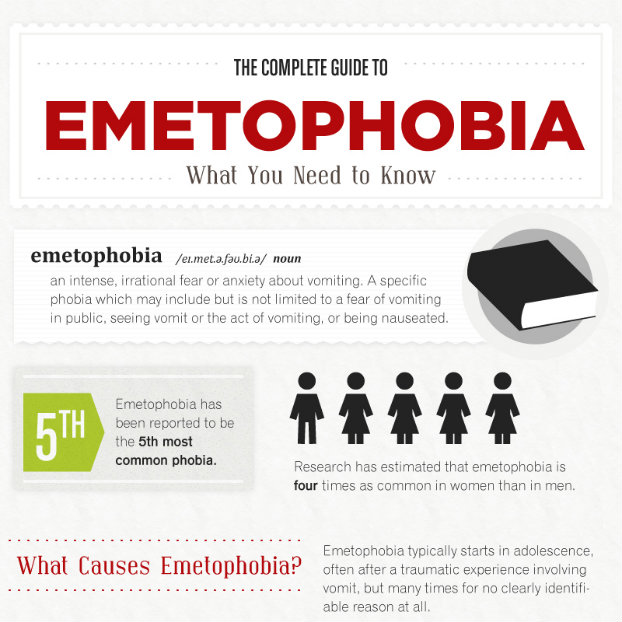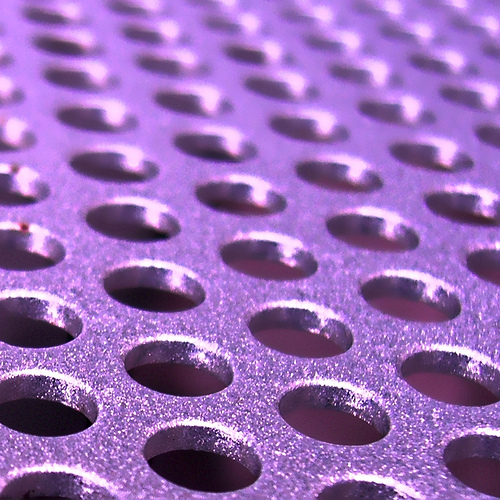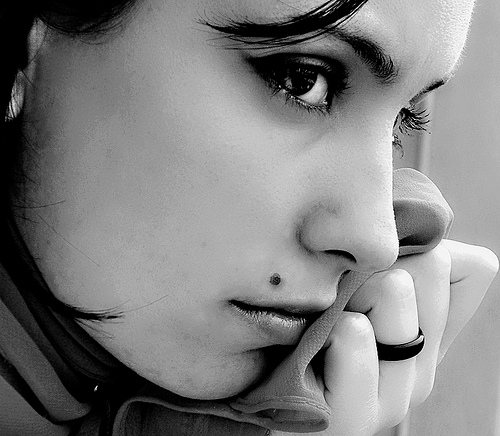 Food and emetophobics typically have a testy relationship at best. At worst, you may be severely restricting or limiting where or when you eat, what you eat, or if you even eat at all. While keeping track of all the limits and restrictions can be harrowing enough, emetophobics who do so may end up compounding the issue by developing an eating disorder.
Food and emetophobics typically have a testy relationship at best. At worst, you may be severely restricting or limiting where or when you eat, what you eat, or if you even eat at all. While keeping track of all the limits and restrictions can be harrowing enough, emetophobics who do so may end up compounding the issue by developing an eating disorder.
An Internet survey of 56 online emetophobia support group members had about 75 percent of them admitting they engaged in eating rituals or severely limited the foods they ate. Another study, this one published in European Eating Disorders Review, surveyed 94 people who suffered from a specific phobia of vomiting and found that the 32 who restricted their food had a notably higher frequency of abnormal eating behaviors and mental health issues than those who did not restrict their food.
Even when the rituals and eating restrictions start out as a way to avoid the perceived risk of vomiting, they are often the same types of behaviors found in the eating disorder of anorexia.
Signs of Anorexia
Anorexia often leads to a severely reduced, unhealthy weight, leaving you weak, dizzy and obsessive about every little thing you eat. The issues that lead to anorexia are rarely about food at all, but instead stem from psychological issues regarding body image, self-worth or, in the case of the emetophobic, fear of vomiting.
Like many disorders, anorexia hits its victims on the physical, emotional and behavioral levels, with several red flags and symptoms pointed out by Mayo Clinic.
Red Flags
Those suffering from anorexia often try to hide the red flags from others, although it’s tough to hide things from yourself. The mind, however, is a tricky little bugger and it could be serving up rationalizations for behaviors that point to the disorder. Anorexia often comes with behaviors that include:
- Making up reasons for not eating
- Eating only select “safe” foods, which are usually low in calories for the typical anorexia and may be foods least likely to lead to vomiting for the emetophobic
- Skipping meals altogether
- Creating and maintaining a strict set of eating or meal rituals, such as eating foods only in a certain order, only at a specific time or only when cut up into tiny little pieces and chewed 42 times each
- Avoiding eating in public or around others
- Avoiding people, places and things where food may be served or eating may be part of the event
Symptoms
Once anorexia starts to pick up steam, you may begin to develop a host of physical and mental symptoms that are tougher to hide than your eating rituals or meal skipping.
Physical symptoms can include:
- Severe weight loss or gaunt appearance
- Abnormal blood counts and low blood pressure
- A blue tint in the fingers and intolerance of cold
- Fainting, dizziness and fatigue
- Insomnia
- Thinning hair that breaks off easily
- Downy, soft hair covering the entire body
- Dry skin
- Constipation
- Irregular heart rhythms
- Loss of menstruation
- Dehydration
- Swelling in the arms or legs
Because your body is not getting enough nutrients, your systems may start to slow down and eventually shut down as it goes into starvation mode.
Mental and behavioral symptoms can include:
- Pretending not to be hungry, or denying your hunger
- Refusing to eat no matter what
- Lying to others about how much you ate (or didn’t eat)
- Lack of emotion
- Reduced interest in sex
- Irritability and social withdrawal
- Depression
- Increased fear of vomit, which increases the disorder’s progression
Other Issues Stemming from Emetophobia
Severe Dieting
Even if you don’t develop a full-blown case of anorexia, you can take your eating habits into the realm of severe dieting. Not providing your body with enough nutrients and calories to function properly is typically asking for trouble with an increased risk of additional health issues and decreased energy and vibrancy.
Severe dieting may stem from the fear of vomiting if you eat enough to become full. Those who harbor that belief may always go out of their way to ensure they stop eating when they are nowhere near full and sometimes even still hungry.
Fear of Food
Anorexia is the fear of eating, which is different than the fear of food. The fear of food, officially known as cibophobia, is not an eating disorder per se but it is a psychological issue that can stem from emetophobia.
Other factors can contribute to food phobia, such as the belief that certain foods may be harmful, toxic, poisoned or otherwise unsafe. Food allergies, moral or religious food restrictions and body image issues can likewise contribute to cibophobia, WiseGeek notes.
Symptoms of cibophobia can include:
- Obsessively checking food expiration dates
- Obsessively reading labels and checking ingredients
- Aversion to meat or animal products
- Avoidance of perishable items
- Refusing to eat items with unknown or unmonitored cooking methods
Cibophobics who do eat a food to which they have a strong moral, religious or other aversion can end up becoming nauseous or even violently ill, WiseGeek says. The illness comes from the psychological stress of consuming a “forbidden” food with which they have such a tempestuous relationship. The nausea and illness can be accompanied by shaking, shortness of breath, chest pain and other anxiety symptoms or even a full-blown panic attack.
So Now What?
Discussing disorders that can stem from emetophobia is not meant to scare you, but it is meant to encourage you to keep a keen eye on your overall health. As noted, the mind can be a tricky little bugger that likes to jump on anxiety issues and ride them where it may. Addressing your emetophobia and related issues is possible, even if you start with something small like trying mindfulness techniques for stress or tips and tricks for alleviating anxiety.
Therapy can also be helpful, as can home programs designed to not only address but to help you eradicate your vomit fears. The first step is awareness of the issue, which you already have, which can be followed by change for the better.
SOURCES:
- http://phobias.about.com/od/phobiaslist/a/emetophobia.htm
- http://www.wisegeek.com/what-is-cibophobia.htm
- http://www.wisegeek.com/how-do-i-overcome-a-fear-of-vomiting.htm
- http://www.mayoclinic.com/health/anorexia/DS00606/DSECTION=lifestyle-and-home-remedies
- http://onlinelibrary.wiley.com/doi/10.1002/erv.1159/abstract;jsessionid=01CF24AA2344926939C88413AB5E4F5B.d01t03?deniedAccessCustomisedMessage=&userIsAuthenticated=false
- http://onlinelibrary.wiley.com/doi/10.1002/da.1058/abstract
Study info:
- Lipsitz, J. D., Fyer, A. J., Paterniti, A. and Klein, D. F. (2001), Emetophobia: Preliminary results of an internet survey. Depress. Anxiety, 14: 149–152. doi: 10.1002/da.1058
- Veale, D., Costa, A., Murphy, P. and Ellison, N. (2012), Abnormal Eating Behaviour in People with a Specific Phobia of Vomiting (Emetophobia). Eur. Eat. Disorders Rev., 20: 414–418. doi: 10.1002/erv.1159
Photo Credit: Andrew.Beebe via Compfight cc





